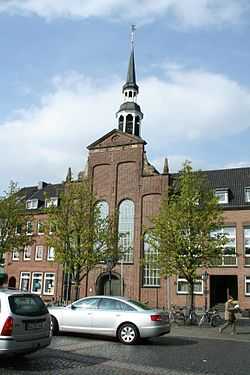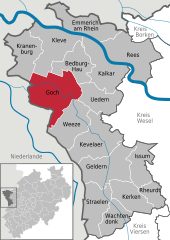Goch
From Wikipedia, the free encyclopedia
| Goch | ||
|---|---|---|
 | ||
| ||
 Goch | ||
Location of Goch within Kleve district 
 | ||
| Coordinates: 51°41′2″N 06°9′43″E / 51.68389°N 6.16194°ECoordinates: 51°41′2″N 06°9′43″E / 51.68389°N 6.16194°E | ||
| Country | Germany | |
| State | North Rhine-Westphalia | |
| Admin. region | Düsseldorf | |
| District | Kleve | |
| Government | ||
| • Mayor | Karl-Heinz Otto (CDU) | |
| Area | ||
| • Total | 115.38 km2 (44.55 sq mi) | |
| Elevation | 18 m (59 ft) | |
| Population (2012-12-31)[1] | ||
| • Total | 32,894 | |
| • Density | 290/km2 (740/sq mi) | |
| Time zone | CET/CEST (UTC+1/+2) | |
| Postal codes | 47574 | |
| Dialling codes |
02823, 02827 (Kessel, Hassum, Hommersum) | |
| Vehicle registration | KLE | |
| Website | www.goch.de | |
Goch (archaic spelling: Gog, Dutch: Gogh) is a town in the district of Kleve, in North Rhine-Westphalia, Germany. It is situated close to the border with the Netherlands, approx. 12 km (7 mi) south of Kleve, and 27 km (17 mi) southeast of Nijmegen.
History
Goch is at least 750 years old: the earliest mention of Goch is in a document dated 1259. It was a part of the Duchy of Cleves. During World War II, the city was completely destroyed by Allied bombers.[2]
Notable natives and residents
The city is the birthplace of:
- Olympic Champion Josefa Idem
- Otto III, Holy Roman Emperor
- Medieval theologian Johannes von Goch
- Arnold Janssen, founder of the Society of the Divine Word, a Roman Catholic missionary congregation
The Spanish author, military leader, and governor of the Spanish Netherlands, Francisco de Moncada, died here in 1635.
Cultural ties
It is twinned with the town of Andover in England, the town of Redon in France and the town of Veghel in the Netherlands.
References
- ↑ "Amtliche Bevölkerungszahlen". Landesbetrieb Information und Technik NRW (in German). 31 July 2013.
- ↑ "Stadtgeschichte". Stadt Goch. Retrieved 30 May 2013.
| |||||||
This article is issued from Wikipedia. The text is available under the Creative Commons Attribution/Share Alike; additional terms may apply for the media files.
